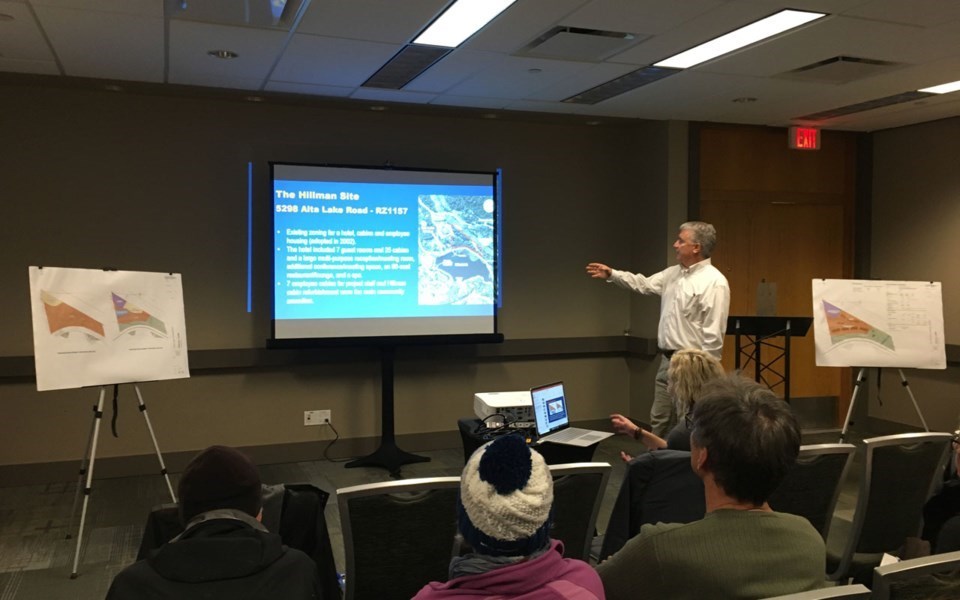If you’re a fan of marathon public hearings, boy, have I got good news for you.
Whether a hardcore politico or nearby resident, you will have a second chance for input into a housing development slated for 5298 Alta Lake Road after a procedural oversight by the Resort Municipality of Whistler (RMOW) triggered a redo on a public hearing that was held almost exactly one year ago to the day.
“Staff really want to acknowledge the huge setback this is in terms of the processing trajectory for this rezoning application and staff really want to reach out and say thank you to the applicant for being so very understanding,” said planning manager Melissa Laidlaw at the regular meeting of council on Tuesday, March 8.
If approved, the project proposed by Empire Club Development would add 21 employee-restricted units, 11 tourist-accommodation units, and 11 market residential units to the 1.93-hectare parcel on the shores of Nita Lake. Because the development necessitates an amendment to Whistler’s Official Community Plan (OCP) bylaw, the RMOW had a statutory obligation to consult with several public bodies prior to first reading. One of those is School District 48, which was not notified in time. The school board has since responded, indicating the project would result in a potential increase to the Kindergarten-to-Grade-12 population of about 10 children, and “further noted that with the way their schools are operating at capacity, any potential increase in student population will have an impact on our schools,” Laidlaw said.
Council voted to rescind third reading of that bylaw, along with a zoning amendment bylaw that, while not triggering the same consultation requirements, will still be considered at a future public hearing alongside the OCP amendment, “as the two bylaws are so intrinsically connected,” noted Laidlaw.
The Empire Club project was first proposed in 2018, one of the first to be considered under the RMOW’s private developer guidelines for employee housing. General manager of resort experience Jessie Gresley-Jones said in an interview following the March 8 meeting that staff were so focused on getting Whistler’s updated OCP adopted in 2020 that they missed an important procedural step.
“I think we’ve been in a mindset of trying to get the OCP approved for many years and not in the process of amending,” he said. “So, yeah, it was a step missed and really unfortunate. I think the positive in this is that there are many conditions to be met prior to adoption and so the work on those has continued to occur in the background while we’re making this corrective action.”
The project garnered swift and significant backlash after it was put forth, and has been amended multiple times to better accommodate both staff and residents’ concerns. Although opinion in the community seemed to sway against the development in its early incarnations, a lengthy public hearing held over Zoom last March was fairly evenly divided between backers and critics.
The proponent has a long list of conditions to meet for the project to move forward, including the transfer of 1.44 ha. for a nature conservation area and community park, 0.5 ha. of land dedicated to future employee housing, the restoration of two heritage buildings on the site, and an extension to the Valley Trail.
Gresley-Jones did not know off the top of his head the additional staff time and costs that will be dedicated to arranging a second public hearing, but said the extra staff time “wasn’t substantive.”
Notably, this is not the first OCP-related snafu to hit municipal hall. In 2014, a B.C. Supreme Court judge quashed adoption of Whistler’s OCP from a year prior—forcing it to revert back to an older OCP from 1993—after it ruled the province had not adequately consulted with the Lil’wat and Squamish Nations as required. It wasn’t until June of 2020 that Whistler’s new OCP was finally adopted, nearly a decade after the RMOW first set out to update its foundational planning document.





